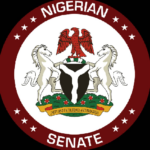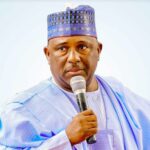President Muhammadu Buhari has proposed to spend 15 per cent of the N16.39 trillion 2022 budget on defence and the security, with the sectors again topping the chat with N2.41 trillion for the military, police, intelligence and paramilitary.
For infrastructure, the federal government budgeted N1.451 trillion (8.9%) for works and housing, power, transport, water resources and aviation, while the education sector got N1.290trn (7.9%).
- Africa Magic teases movie biopic on Aisha Buhari
- Media Trust celebrates partners, customers, readers, others
On social development and poverty reduction programmes, the federal government budgeted N863 billion (5.3%) for social investment and poverty reduction programmes while health got N820.2bn (5%).
Overall, the president proposed N6.83trn recurrent expenditure, N5.35tn for capital and N3.61trn for debt servicing with about N6trn as the projected deficit.
The Minister of Finance, Budget and National Planning, Zainab Ahmed, gave the breakdown during a public presentation of the highlights of the 2022 Appropriation Bill yesterday.
She blamed huge budget on defence and security for the widening fiscal deficit for the 2022 Budget.
She said, “With the pervasive security challenges within the country, there is a need for sustained funding of the security services, and this has necessitated massive expenditures in security equipment and operations and has contributed to fiscal deficit.”
She, however, dismissed worries about rising debt, saying lack of adequate revenue generation to finance the budget was the major challenge.
“What we have is a revenue problem, and we are working on it to be able to fully fund the operations of the government, as well service our debt obligations. Borrowings are essential for us to be able to continue to deploy necessary capital expenditures and human development,” she said.
She stated that the N16trn to be spent was small compared to over N100trn already spent on the Nigerian economy.
The minister said Nigeria needed 50 per cent of its current Gross Domestic Product (GDP) to be able to have infrastructural development and growth that would translate into a meaningful economic growth.
Why Nigeria’s debt exceeded 3% of GDP
The minister said that under the Fiscal Responsibility Act, Section 41. 1, the country could borrow to invest in capital expenditure and human development as long as the borrowing does not exceed 3 per cent of GDP.
“This year, we have exceeded the 3 per cent by 0.39 per cent, but this has been allowed in the Fiscal Responsibility Act, a provision that states the president can exceed the 3 per cent threshold where there is a national emergency.
The minister also blamed the two recessions in the last five years for the rise in the country’s debt.
FIRS generates N4.2trn so far in 2021
Speaking, the chairman of the Federal Inland Revenue Service (FIRS), Muhammad Nami, said the organisation had generated N4.2trn as at September 30.
He noted that the current diversification of the economy by the present administration was effective as N950 billion (amounting to 22 per cent) was generated from the oil sector, while N3.3trn was generated from the non-oil sector.
Experts express divergent views
Economic experts and analysts have expressed divergent views as they try to analyse the budgetary projections for 2022.
A director of finance and operation at a Washington-based Community Foundation of Snohomish, Kalu Aja, faulted the huge borrowing by the country.
He said, “I prefer to analyse the quarterly performance. However, when a country says borrowing N6trn in 12 months (50% of loan is in $) is ‘within limits’, I shudder because every day the federal government will pay N16bn. I have not added interest.”
Aja also reviewed the federal government’s actual for January to June 2021, which stood at oil revenue – N538bn, non-oil revenues – N778bn, other revenue – N995bn and total revenue – N2.3trn.
‘NNPC commercialisation may cause revenue drop’
A professor of Energy Economics and past president, Nigeria Association of Energy Economics, Prof Omowumi Iledare, however, said the commercialisation of the Nigerian National Petroleum Corporation (NNPC) would have an implication for oil revenue in funding next year’s budget.
He said, “You will expect revenue to fund the federal government’s budget to also go down as the NNPC becomes profit-oriented. What goes to the government from the NNPC will become dividend dependent.
“Yet, the PIA has surrendered 30 per cent of profit oil and profit gas from deep water PSC for frontier exploration fund.”
To get the best of the budget on the basis of the reformed petroleum industry, Iledare said the implementation of all the provisions in the Petroleum Industry Act (PIA) must be such that effectiveness, efficiency, and equity were are sacrificed for political expediency to avert the funding troubles that lay ahead in the short to medium term.
He added that PIA provisions in the fiscal framework with budget funding implications were quite glaring.
“Yes, the provisions are skewed more to output expansion and perhaps sustainable oil revenue in the long than short to medium term. The royalty scheme in the PIA has become less regressive by terrain, but in effect, the effective royalty rate is significantly lower with a cap at 15 per cent compared to the 20 per cent flat for all onshore assets – meaning less revenue from JV assets in the shallow water and onshore.
“Divestment of interests away from onshore and shallow water is a concern with respect to petroleum revenue to fund the budget going forward,” he said.
Faruk Shuaibu, Sunday Michael Ogwu, Simon Echewofun Sunday & Chris Agabi

 Join Daily Trust WhatsApp Community For Quick Access To News and Happenings Around You.
Join Daily Trust WhatsApp Community For Quick Access To News and Happenings Around You.


